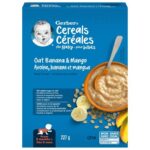The FDA has issued final guidance for lead in children's food. These action levels reflect the levels of lead at which the FDA may regard the food as adulterated. While there are no safe levels of lead consumption, it is not possible to completely remove lead from every food as the heavy metal occurs naturally and is found in air, water, and soil. This guidance supports the Closer to Zero initiative to reduce exposure to contaminants through food to as low as possible. The action levels are 10 parts per billion for fruits, vegetables (except single ingredient root vegetables), mixtures (including grain and meat based mixtures), yogurt, custards and puddings, and single ingredient meats. The level is 20 parts per billion for single ingredient root vegetables, and 20 parts per billion … [Read more...]
Gerber Oat Banana Mango Baby Food Recalled For Cronobacter
Gerber Oat Banana Mango Baby Food is being recalled in Canada for possible Cronobacter contamination. Cronobacter bacteria can cause severe, life-threatening infections or meningitis in infants. Symptoms of this infection can include poor feeding, temperature changes, irritability, jaundice, grunting breaths and abnormal movements. No illnesses have been reported to the company to date in connection with the consumption of this product. The recalling firm is Nestle Canada. The recalled product was sold in these provinces at the retail leel: Alberta, British Columbia, Manitoba, New Brunswick, Ontario, Quebec, and Saskatchewan, and may have been sold in other provinces and territories. It was also sold online. The recalled item is Gerber Oat Banana Mango Baby Cereal that is … [Read more...]
FDA Releases New Total Diet Study Report on Toxic Elements
The FDA has released their new Total Diet Study Report that focuses on the presence of toxic compounds in the foods we eat. The overall takeaway is that the key toxic elements were not detected in most (68%) of the tested foods. The analysis was conducted in foods that were collected from 2018 through 2020. Overall, 3,276 food, beverages, and water products were studied. The key elements studied were lead, arsenic, including inorganic arsenic, the most dangerous form, cadmium, and mercury. Overall, lead was found in 15% of the samples, arsenic in 43%, cadmium in 61%, and mercury in 8%. The categories of food included in the study were alcohol, baked goods, baby food, beverages, candies, condiments, dairy, fruit, grains, meats, ingredients like sugar and flour, compound foods such as … [Read more...]
FDA Announces Action Plan on Heavy Metals in Baby Food
After the U.S. House Subcommittee report that was issued last month about the amount of toxic heavy metals in baby food, the FDA is announcing new actions. The report found that four of the seven major baby foods made in this country have unacceptably high levels of cadmium, mercury, and lead. The remaining three corporations refused to supply information about their products. First, a letter to industry was issued reminding manufacturers of their responsibilities when producing these foods. And the agency will put a plan into action to reduce toxic elements in foods for babies and young children to levels "as low as is reasonably achievable." Manufacturer's responsibilities include considering risks from chemical hazards, including toxic elements, when conducting a hazard … [Read more...]
FDA Releases Infant Rice Cereal Arsenic Tests; Improvement Noted
The FDA is releasing information about their testing of infant rice cereal arsenic results that show manufacturers have made "significant progress" reducing levels of inorganic arsenic, the most dangerous type, in their products. There are two types of arsenic: organic arsenic, which is mainly found in seafood and may not be toxic to humans, and inorganic arsenic, which is highly toxic. Organic arsenic bonds with carbon, but inorganic arsenic bonds with a non-carbon element such as oxygen. Most people consume inorganic arsenic from drinking water and foods. A study conducted in 2017 found that there is six times more arsenic in infant rice cereal than other types of cereals. Rice can contain arsenic because of how it is grown. The rice plants are planted in old cotton fields in … [Read more...]










